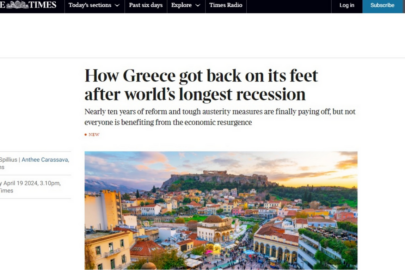Finance Minister Euclid Tsakalotos asked for a clear-cut solution on the Greek debt on Wednesday, speaking at an Economist conference held in Frankfurt titled “A glimpse into Europe’s financial landscape-Greece: A comeback to the financial markets?”
“It seems there’s wide agreement that Greece has met its commitments concerning reforms,” Tsakalotos said adding most sides are amazed by the degree to which the country has kept these commitments, as well as the range and depth of the reforms.
“After such an effort, what the Greek government is asking is clarity on the debt issue. And this was not achieved at the Eurogroup table on May 22. Clarity is very important; it is important for the Greek people, as after many years (…) there’s a prospect for a new start. It is also very important for investors. Investors need to know in which way Greece will be able to meet its borrowing obligations in the short and long term. So it is absolutely crucial for growth to have clarity. That is what we are calling for at the Eurogroup meeting in June,” he added.
Tsakalotos also spoke about the stance of the International Monetary Fund (IMF), noting that the Greek government is asking for clarity and that in the last Eurogroup it claimed that the measures taken, or which will be taken on debt relief are not enough to make it sustainable.
“The IMF promised to participate in the program on August 2015. It’s been two years since then. We’ve only got 14 months of a program to go. It seems to me that it’s time for the IMF to make up its mind on what it wants to do and what it thinks needs to be done,” the minister said.
He continued noting that Germany and the Netherlands have indicated they will refuse to lend more money to Greece without the IMF’s participation.
“Either because they believed that this would ensure a stricter program or because they believed that European institutions lacked the know-how. If so, then the IMF cannot be good for structural reforms and advice on structural reforms (…) but not have an opinion on the debt relief needed,” he explained, adding the two countries must find a compromise with the IMF on debt sustainability.





































